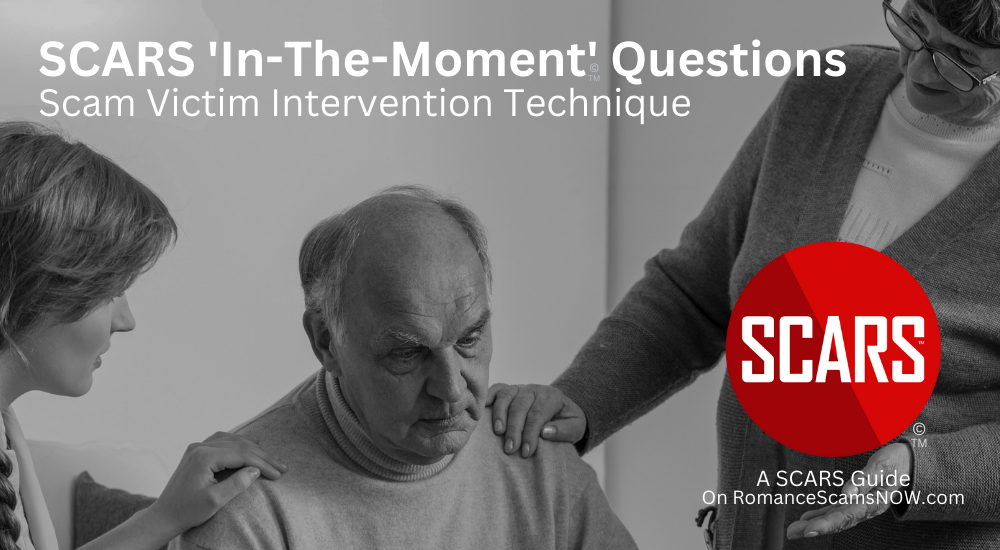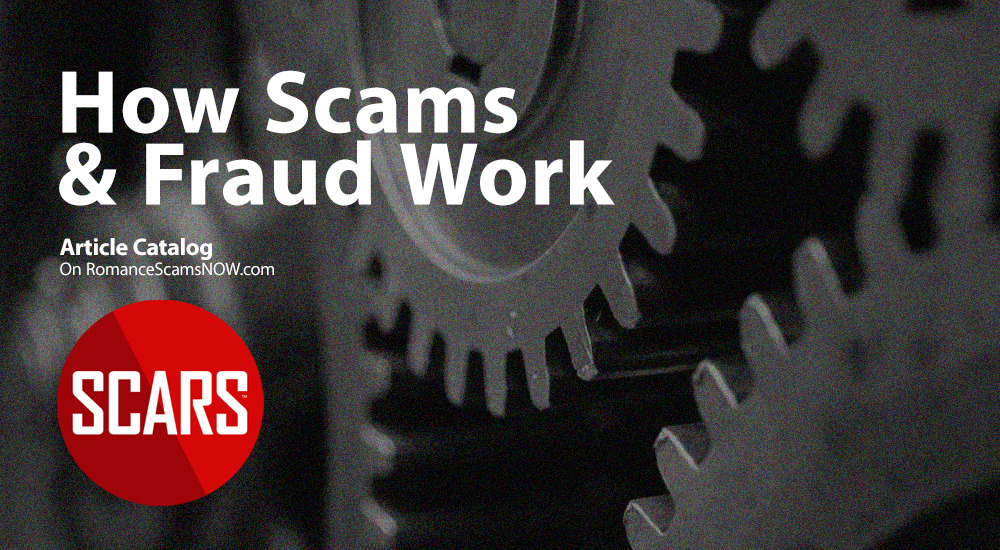
SCARS Institute’s Encyclopedia of Scams™ Published Continuously for 25 Years

Author:
• SCARS Editorial Team – Society of Citizens Against Relationship Scams Inc.
Article Abstract
The COVID Fraud Enforcement Scam is a concerning new trend sweeping across the United States, blending tech-support fraud with government impersonation to deceive unsuspecting victims.
Victims receive fabricated court documents claiming they are under investigation for PPP fraud, with instructions to visit a cryptocurrency kiosk to lift a purported arrest warrant.
Law enforcement agencies warn of sophisticated scams impersonating government officials, urging vigilance and skepticism towards unsolicited communications.
Victims are advised to verify the legitimacy of requests and promptly report scams to the FBI. This emerging threat underscores the need for increased awareness and caution in safeguarding against financial exploitation.

COVID Fraud Enforcement Scam is One of the Multitude of New Scams to Emerge
The COVID Fraud Enforcement Scam is a new form of government impersonation scam that is sweeping across the United States, blending elements of tech-support fraud with government impersonation to deceive both individuals and businesses.
The United States Attorney’s Offices and the FBI have issued a public warning about this emerging threat, urging vigilance and caution.
How the COVID Fraud Enforcement Scam Works
In this scam, victims receive what appears to be an official court document via email, U.S. mail, text message, or website pop-up.
The document claims that the recipient is under investigation for Paycheck Protection Program (PPP) fraud and asserts that an arrest warrant has been issued by the Department of Justice (DOJ) Civil Division’s Commercial Litigation Branch.
To purportedly “lift the warrant,” victims are instructed to visit a cryptocurrency kiosk and make a designated payment. However, these notices and documents are entirely fabricated, and individuals who receive them are encouraged to report the incident to the FBI at https://www.ic3.gov.
Obviously, the scammers are continually refining their tactics to appear more credible and succeed in defrauding unsuspecting victims of their money.
There has been a noticeable increase in scams where perpetrators impersonate law enforcement officers, government agencies, banks, or companies to coerce victims into relinquishing money or valuables, or their personal information.
To combat this threat, law enforcement agencies urge the public to remain vigilant and treat unsolicited communications with skepticism. Individuals should verify the authenticity of any requests for payment or personal information before taking action.
Government agencies do not make first contact with individuals via email or text to issue summons, demand payment, or threaten arrest.
Everyone is advised to verify the legitimacy of any communication by contacting the relevant agency directly using the publicly listed contact information on their official website.
Victims of such scams are urged to report the incident to the FBI’s Internet Crime Complaint Center – visit reporting.AgainstScams.org for their information.
Consumers who encounter requests to wire money, pay cryptocurrency, or transport large sums of cash to avoid legal consequences or resolve any similar issues should cease communication immediately and report the incident to the FBI and the FTC.
If the scammers have said they would come to the victim’s address to pick up the money – be sure and contact the local police too.
According to the U.S. Attorney and the FBI:
A new twist on an old scam is targeting consumers and businesses throughout Northeast Ohio. The United States Attorney’s Office, Northern District of Ohio, and FBI Cleveland are warning the public about a scam that combines aspects of tech-support fraud with government impersonation.
In this scam, the victim receives a document or documents resembling an official court document both in its format and language, sent through an email, the U.S. Mail, a text, or website pop-up. The document and/or accompanying notice state that the victim is being investigated for Paycheck Protection Program (“PPP”) fraud and that an arrest warrant has been issued. The notice asserts that the Department of Justice (“DOJ”) Civil Division’s Commercial Litigation Branch has issued it, and it states that, to “lift the warrant,” the victim must go to a cryptocurrency kiosk and make a designated payment. Such notices and documents are fake, and persons who receive them should report receiving them to the FBI at https://www.ic3.gov.
“Fraudsters are often quite sophisticated. Time and again, we see these criminals refine their schemes to make their false claims seem more believable, and then succeed in cheating our community members of their hard-earned money,” said U.S. Attorney Rebecca C. Lutzko. “Recently, we are seeing more and more scammers impersonate law enforcement officers, government agencies, banks, and companies, and use these false personas to convince their victims to hand over money, gold, or other things of value. The United States Attorney’s Office, the FBI, and our other law enforcement partners will continue to pursue such scammers aggressively, but we would much rather prevent a scam than prosecute one. Please remain vigilant, treat unsolicited emails, texts, and pop-up ads with suspicion, and check in on friends or loved ones who you think might be particularly susceptible to these types of scams. And if you believe that either you or someone you know has been the victim of a scam, promptly report it to the FBI or, if appropriate, call the National Elder Fraud Hotline at 1-833-FRAUD-11 [1-833-372-8311].”
“Scammers are becoming increasingly clever in the way they are portraying government agencies and banking and financial institutions,” said FBI Cleveland Special Agent in Charge Greg Nelsen. “This scam– creating bogus documents designed to look like a court summons and compelling the victim to oblige or face arrest, jail time, or further action, highlights the efforts the criminals will take to dupe unsuspecting victims. We can’t stress enough to the public that the government will not contact you via email or text with a summons for action, payment, or arrest and instead, urge residents to place a phone call with the publicly listed phone number of the government agency, not the number or email listed in the [bogus] document, to confirm if a communication was sent by that agency. Typically, it’s a scam. And in that case, we ask that you report it to the FBIs Internet Crime Complaint Center at ic3.gov.”
More on Government Impersonation:
- Government Impersonation Scams Are On The Rise! (scamsnow.com)
- Scam Victims Compliance With Scammer Authority Figures – 2024 (scamsnow.com)
- New Government Impersonation Scam Warning (romancescamsnow.com)
- Police Impersonation Scam Phone Calls – How Scams Work (romancescamsnow.com)
- Warning: Scammers Are Impersonating The U.S. Government More Than Ever! (romancescamsnow.com)
- Government Impersonation Scam [INFOGRAPHIC] (romancescamsnow.com)
- Impersonation of Law Enforcement and Government Officials (romancescamsnow.com)
- FTC Impersonation Scams (romancescamsnow.com)
- U.S. Federal Trade Commission Pivots In Major Change On Impersonation Scams (romancescamsnow.com)
-/ 30 /-
What do you think about this?
Please share your thoughts in a comment below!
LEAVE A COMMENT?
Recent Comments
On Other Articles
- Arwyn Lautenschlager on Love Bombing And How Romance Scam Victims Are Forced To Feel: “I was love bombed to the point that I would do just about anything for the scammer(s). I was told…” Feb 11, 14:24
- on Dani Daniels (Kira Lee Orsag): Another Scammer’s Favorite: “You provide a valuable service! I wish more people knew about it!” Feb 10, 15:05
- on Danielle Delaunay/Danielle Genevieve – Stolen Identity/Stolen Photos – Impersonation Victim UPDATED 2024: “We highly recommend that you simply turn away form the scam and scammers, and focus on the development of a…” Feb 4, 19:47
- on The Art Of Deception: The Fundamental Principals Of Successful Deceptions – 2024: “I experienced many of the deceptive tactics that romance scammers use. I was told various stories of hardship and why…” Feb 4, 15:27
- on Danielle Delaunay/Danielle Genevieve – Stolen Identity/Stolen Photos – Impersonation Victim UPDATED 2024: “Yes, I’m in that exact situation also. “Danielle” has seriously scammed me for 3 years now. “She” (he) doesn’t know…” Feb 4, 14:58
- on An Essay on Justice and Money Recovery – 2026: “you are so right I accidentally clicked on online justice I signed an agreement for 12k upfront but cd only…” Feb 3, 08:16
- on The SCARS Institute Top 50 Celebrity Impersonation Scams – 2025: “Quora has had visits from scammers pretending to be Keanu Reeves and Paul McCartney in 2025 and 2026.” Jan 27, 17:45
- on Scam Victims Should Limit Their Exposure To Scam News & Scammer Photos: “I used to look at scammers photos all the time; however, I don’t feel the need to do it anymore.…” Jan 26, 23:19
- on After A Scam, No One Can Tell You How You Will React: “This article was very informative, my scams happened 5 years ago; however, l do remember several of those emotions and/or…” Jan 23, 17:17
- on Situational Awareness and How Trauma Makes Scam Victims Less Safe – 2024: “I need to be more observant and I am practicing situational awareness. I’m saving this article to remind me of…” Jan 21, 22:55
ARTICLE META
Important Information for New Scam Victims
- Please visit www.ScamVictimsSupport.org – a SCARS Website for New Scam Victims & Sextortion Victims
- Enroll in FREE SCARS Scam Survivor’s School now at www.SCARSeducation.org
- Please visit www.ScamPsychology.org – to more fully understand the psychological concepts involved in scams and scam victim recovery
If you are looking for local trauma counselors please visit counseling.AgainstScams.org or join SCARS for our counseling/therapy benefit: membership.AgainstScams.org
If you need to speak with someone now, you can dial 988 or find phone numbers for crisis hotlines all around the world here: www.opencounseling.com/suicide-hotlines
A Note About Labeling!
We often use the term ‘scam victim’ in our articles, but this is a convenience to help those searching for information in search engines like Google. It is just a convenience and has no deeper meaning. If you have come through such an experience, YOU are a Survivor! It was not your fault. You are not alone! Axios!
A Question of Trust
At the SCARS Institute, we invite you to do your own research on the topics we speak about and publish, Our team investigates the subject being discussed, especially when it comes to understanding the scam victims-survivors experience. You can do Google searches but in many cases, you will have to wade through scientific papers and studies. However, remember that biases and perspectives matter and influence the outcome. Regardless, we encourage you to explore these topics as thoroughly as you can for your own awareness.
Statement About Victim Blaming
SCARS Institute articles examine different aspects of the scam victim experience, as well as those who may have been secondary victims. This work focuses on understanding victimization through the science of victimology, including common psychological and behavioral responses. The purpose is to help victims and survivors understand why these crimes occurred, reduce shame and self-blame, strengthen recovery programs and victim opportunities, and lower the risk of future victimization.
At times, these discussions may sound uncomfortable, overwhelming, or may be mistaken for blame. They are not. Scam victims are never blamed. Our goal is to explain the mechanisms of deception and the human responses that scammers exploit, and the processes that occur after the scam ends, so victims can better understand what happened to them and why it felt convincing at the time, and what the path looks like going forward.
Articles that address the psychology, neurology, physiology, and other characteristics of scams and the victim experience recognize that all people share cognitive and emotional traits that can be manipulated under the right conditions. These characteristics are not flaws. They are normal human functions that criminals deliberately exploit. Victims typically have little awareness of these mechanisms while a scam is unfolding and a very limited ability to control them. Awareness often comes only after the harm has occurred.
By explaining these processes, these articles help victims make sense of their experiences, understand common post-scam reactions, and identify ways to protect themselves moving forward. This knowledge supports recovery by replacing confusion and self-blame with clarity, context, and self-compassion.
Additional educational material on these topics is available at ScamPsychology.org – ScamsNOW.com and other SCARS Institute websites.
Psychology Disclaimer:
All articles about psychology and the human brain on this website are for information & education only
The information provided in this article is intended for educational and self-help purposes only and should not be construed as a substitute for professional therapy or counseling.
While any self-help techniques outlined herein may be beneficial for scam victims seeking to recover from their experience and move towards recovery, it is important to consult with a qualified mental health professional before initiating any course of action. Each individual’s experience and needs are unique, and what works for one person may not be suitable for another.
Additionally, any approach may not be appropriate for individuals with certain pre-existing mental health conditions or trauma histories. It is advisable to seek guidance from a licensed therapist or counselor who can provide personalized support, guidance, and treatment tailored to your specific needs.
If you are experiencing significant distress or emotional difficulties related to a scam or other traumatic event, please consult your doctor or mental health provider for appropriate care and support.
Also read our SCARS Institute Statement about Professional Care for Scam Victims – click here to go to our ScamsNOW.com website.
















Thank you for your comment. You may receive an email to follow up. We never share your data with marketers.